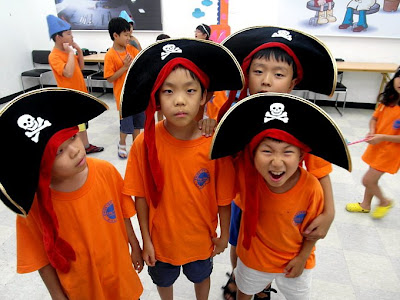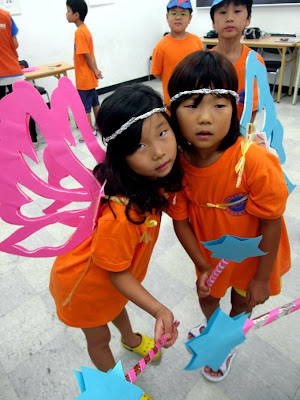We had the kids from 9A-9P and camp had to be fun!
Swimming, sports, role-playing rooms, noraebang room and lots of games in-between to bribe the kids with if they ever got bored. The only stipulation was the end project being a staged "musical".
And it had to be good enough to match the high expectations of high-level corporate Korean parents who work in Seoul!
Role playing in the hospital room


The work was grueling, but it was the most fun I've ever had. I finally got to coach and direct Korean kids towards talents and skills I'm passionate about... performing!
Casting and directing a musical:
Acting, dancing, singing... don't let youth fool you. Kids as young as 2nd grade (the youngest I've had so far) are perceptive and can perform at a surprising caliber.
Sometimes I spot budding talent straight off; other times, I recognize it while they're rehearsing and learning things. Kids offer so many interesting variables to work with.
A mischievous personality might be great for "character acting" but they've got to be disciplined before they can be directed. Or maybe, your brightest and most vocal student has all the confidence to carry the lines of the lead but falls short in the acting personality department. Ai, what to do?
I'd also get curve ball cases, where I didn't initially see talent but it sparked and surprised me. A shy/quiet girl might have natural dancing ability or a shy student might floor me by volunteering to speak hard dialogue and then nail it.
Other times, I'd have to woo students into what I thought they'd be best for or sell a role in a way which would make them want to do it. One of my brightest students was shy in volunteering for the lead so it went to a bolder student, who really wanted it. Unfortunately, the bold one went mousy when it came to performing. I told my first choice that she had to do the lead. And you know-- she nailed everything like a professional... a natural ingenue! Another time, I had a painfully mouse and I a role of a girl pirate, which no one wanted to be. I had to sell it to her as one of the coolest "chick" roles, where she'd get to brandish a sword and be cool,dangerous, tough. She came out of her shell and acted the role the way I envisioned it!
The key is sensing how to access the nuggets of gold kids possess and direct them towards it!
My top 4 major requirements for good ESL acting:
- Loud and clear voices !
Emphasize they're speaking voice must read the backrow of the audience and practice that with them. Also work on pronunciation. Nothing is more of a turn-off than a thick accent where you can't decipher what's being said. - Big expressions !
Like whooping large! There's a reason why theatrical shows are so dramatic and expressive. Films can do closeups of emotions but on stage, there's none of that. If gestures aren't large, the audience won't see them. - Acting for the audience, and not each other.
Remind them to face forward. Actions must be done for the audience. (i.e. if two characters are talking, they must cheat towards the audience and not close their bodies to each other) - The show must go on!
Kids are good at memorizing in Korea, but just what if your lead forgets a line? Have them understand that "perfection" is not the goal, but being comfortable with the lines and understanding the gist of what's being said. If they forget, they can just use their own words.
My 6 Rules of Kids on the Stage:
- Kids learn by copying, but if you give them breathing space to be themselves, you may stumble upon genius talent. In other words, give them an outline but then, let them color it in.
- A teacher is the role model: you can't expect kids to know/ learn it if you can't do it first yourself.
- Students will perform better if they understand and relate to why they're doing something.
- Memory has a stronger anchor if it's tied to movement and emotion.
- Kids are capable of acting with sincerity and passion.
- Have faith that children will come through and do their best, when it's showtime.
Peter Pan rehearsal (2nd-3rd graders)
The challenge of making a musical:
If you've ever done a 24-hour film shootout contest, this is comparatively harder. I had all of 6 days to sculpt a *wow* factored musical from ESL elementary kids.

Peter! The fairies are dying....

Dying fairies.. but don't worry, they come back to life.
The musical project:
- Each NET was in charge of a team and given a musical.
ie. Peter Pan, Ali Baba, Mama Mia, Wizard of Oz, etc... - We each had 1-2 Korean young adults to help.
- Find your own songs, script dialogue and choreograph movement and dance for the kids to perform to.
- Make your own costumes and props (* props/wardrobe room had a limited supply)
- Time frame to do this in: 6 days!
Here's a downloadable sample of this Peter Pan musical I made for my 2nd-3rd graders (click here).
Photos courtesy of Eduvisor










No comments:
Post a Comment